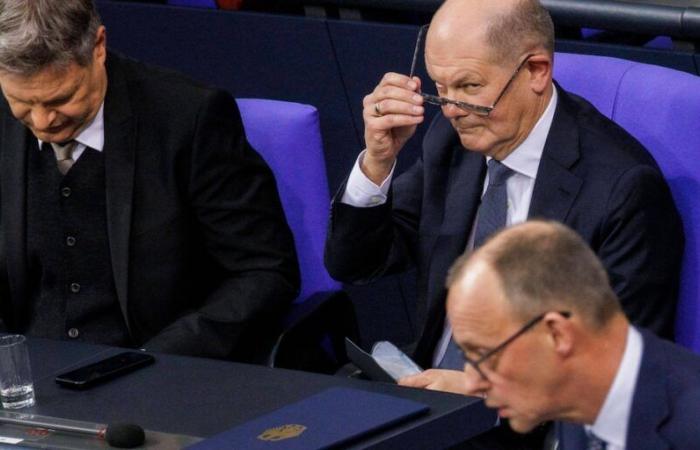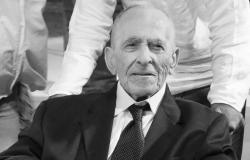The Bundestag’s agenda reads in sober official German: “1 p.m.: Discussion of the Federal Chancellor’s proposal in accordance with Article 68 of the Basic Law, printed matter 20/14150 – roll-call vote”. Doesn’t sound particularly exciting.
It was about a highly political matter that was by no means praiseworthy for the red-green rump coalition: Chancellor Olaf Scholz (SPD), who failed with his traffic light coalition, asked the question of trust. With the aim of clearing the way for new elections.
Play in the Bundestag
The whole thing was like a play whose outcome you knew. It was clear that apart from the SPD faction and a few scattered AfD MPs, no one from the ranks of the CDU/CSU and FDP would express their confidence in Scholz. Likewise, the Greens abstained, which ensured the desired deselection.
In this plenary session, as with every play, the production was important. And it was mainly designed for heavy sabers, not foil.
When SPD parliamentary group leader Rolf Mützenich warned after an hour that a debate on the question of trust required “dignity and decency”, it was already too late. Mützenich also violated his own demands with his attacks on the FDP.
Scholz is not addressing the Bundestag, but the citizens
The main roles in this piece were played by the current chancellor and his challenger Friedrich Merz (CDU). Scholz gave a campaign speech. His appeal to “let’s be honest with each other during the election campaign” was rightly drowned in peals of laughter.
It is revealing that Scholz did not address the ladies and gentlemen or colleagues in the plenary hall in his speech – as is usual in the Bundestag. In between, he repeatedly addressed the citizens directly, as if half of Germany were sitting in front of the screen.
Scholz could have given the same speech in any marketplace. But he didn’t look like the angry, wildly thrashing fairground boxer he did after Federal Finance Minister Christian Lindner (FDP) was thrown out. But he didn’t want to forego low blows against the FDP.
Without mentioning Lindner by name, Scholz philosophized that politics is not a game. And: To govern you need “moral maturity” and responsibility. Apparently Scholz had only recently noticed that his coalition partner had been missing this since the end of 2021.
Merz defends Lindner
The FDP chairman Lindner did not even address the Scholz attacks, demonstrating that he was above his personal attacks. Surprisingly, Merz took over the defense of Lindner and said to Scholz: “What you have addressed to the FDP and Christian Lindner here today is not only disrespectful, but sheer impudence.”
Scholz appeared like an extremely successful chancellor who, quite surprisingly and through no fault of his own, suddenly found himself without a majority. He painted an overall rosy picture of the Federal Republic. The worst economic crisis in two decades and the declining competitiveness of German industry were not mentioned.
Of course, Merz missed the opportunity to present himself as a potential chancellor with a clear program for the future, in contrast to Scholz. Merz was primarily content with the role of opposition leader, who sharply attacked the government.
Habeck deals against Union
As in the 2021 election campaign, Scholz spoke a lot about respect. This gave Merz the opportunity to confront the Chancellor with his “lie” that the CDU/CSU wanted to cut pensions. Merz: The Chancellor’s respect ends with other political views.
The order of battle in this piece was clear: everyone against everyone and everyone – with the exception of the FDP – against the CDU/CSU. The Green Party candidate for chancellor Robert Habeck tried out his favorite discipline: With a new election, not everything will suddenly change positively overnight. But he didn’t last long in his attempt to hover above the party-political lowlands.
Pretty soon the election campaigner also lost his way with the Minister of Economic Affairs. The CDU stands for unsound finances, an end to climate and nature protection and the preference for those who already have everything. If Habeck wanted to avoid the impression that he was trying to get a place in a Merz cabinet, he succeeded.
Low point: Speech by AfD man Chrupalla
The absolute lowest point of the debate was – not unexpectedly – the co-chair AfD. Tino Chrupalla initially praised Scholz for his “prudence” in not supplying Ukraine with Taurus cruise missiles. That should actually be embarrassing for the current chancellor.
Then Chrupalla criticized the “war lovers” in the CDU/CSU, the Greens and the FDP. With a Chancellor Merz, said the right-wing leader, “we can visit our children in the cemetery.” They must have nodded enthusiastically in the Kremlin.
Some politicians and commentators described the meeting on the question of confidence – the sixth in the history of the Federal Republic – as historic.
This debate lasting more than three hours was not a great moment for parliamentarism. She was too influenced by the election campaign for that.
Speaking of historical: December 16th marks the end of the traffic light that started as a progress coalition. However, it is doubtful that historians will give the failed red-yellow-green alliance more than a footnote in future history books.






